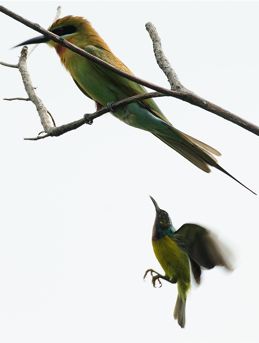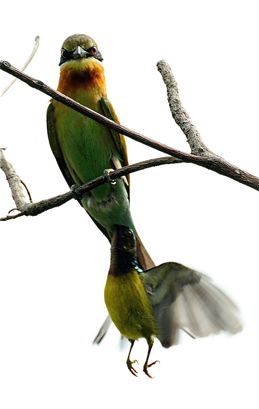Chong Yih Yeong documented a rare moment of a Brown-throated Sunbird (Anthreptes malacensis) mobbing an adult Blue-tailed Bee-eaters (Merops philippinus) perching on a branch. The sunbird attacked the bee-eater two to three times, each time pecking around the vent area.
According to John Vickerman, “…we know that sunbirds are fiercely territorial and it is well known that in defence of territory, attacks can be made on other species – regardless of size – which may be perceived to be a threat to that species’ ownership of territory. I would hazard a guess that this is what this all about – “get off my patch!”
“John is right, the sunbird is highly territorial. I have a pair coming to my balcony to take bath everyday, they will attack any other bird that goes near,” added Adrian Lim.
Most sunbirds are fiercely territorial and during the breeding period the defence is most intense. Usually, the males defend the territories, singing from vantage points and demonstrating aggressive behaviour towards intruding sunbird species. This may be in the form of shrill calls and various bodily movements or even actively chasing the intruders away.
The Copper Sunbird (Cinnyris cupreus) has been reported mobbing the African Masked Weaver (Ploceus velatus), Village Weaver (Ploceus cucullatus), House Sparrow (Passer domesticus) and a number of other species.
However, this is the first account, as far as can be established, of a Brown-throated Sunbird with such aggressive behaviour.
This post is a cooperative effort between NaturePixels.org and BESG to bring the study of bird behaviour through photography to a wider audience.
Reference:
Cheke, R. A. & C. F. Mann, 2008. Family Nectariniidae (Sunbirds). In: del Hoyo, J., A. Elliott & D. A. Christie (eds.), Handbook of the birds of the world. Vol. 13. Penduline-tits to Shrikes. Lynx Editions, Barcelona. Pp. 196-320.











One Response
Indeed, some sunbirds exhibit strong territorial display act especially during the peak breeding season. I was making some images of nesting olive-backed sunbirds when the male returned twice within some 20min time frame and displayed a hovering act immediately infront of my lens within arm’s reach. I was positive that the same male bird would not hesitate to turn aggressive (perceived, cannot be scientifically proven)at closer proximity. However, agreesive as these olive-backed are, they are certainly no match for the male plain-throated sunbirds. For example, a male plain-throated sunbird has been observed to consistently monopolise an entire touch ginger garden for several years and till this day, the male still lay claim to its dominiant of 10 x 10 sq meters.